Sometimes a joke in a sitcom isn’t just funny, and doesn’t just reveal character. Sometimes, a joke is so good it literally seems to define your character. When Father Ted protests “that money was just resting in my account”, or Lieutenant Gruber sheepishly admits that “it was very lonely on the Russian front”, it somehow seems to be everything you need to know about them. A whole life, in a few short words.
For instance, take this joke in Series 1 of Red Dwarf (1988). As Lister prepares to watch Rimmer’s auto-obituary in “Me²”, he notices the following caption at the start.
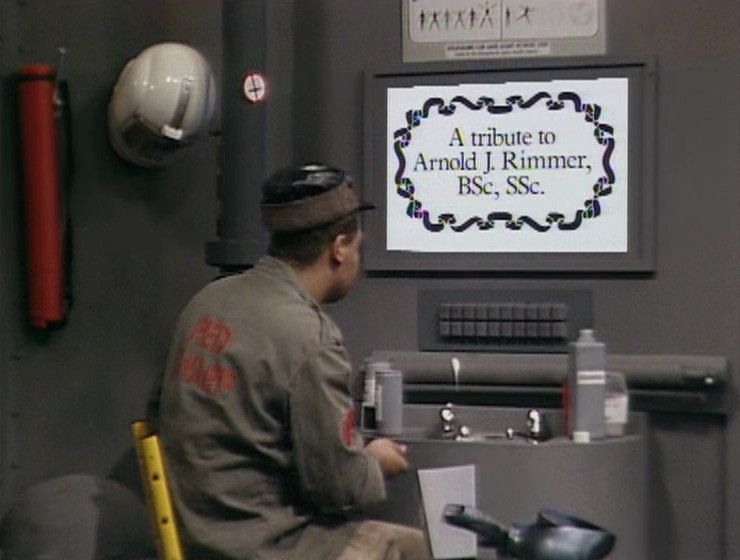
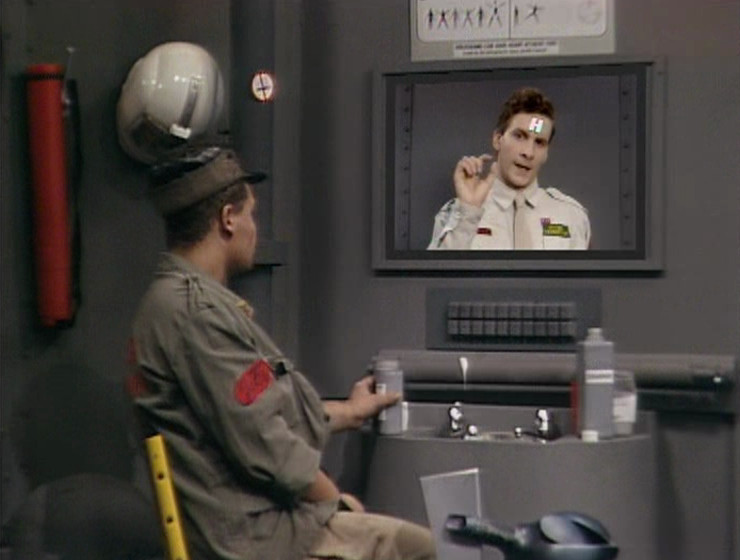
HOLLY: “BSc, SSc?” What’s that?
LISTER: Bronze Swimming certificate and Silver Swimming certificate. He’s a total lunatic.
In that moment, you feel like you know everything there is to know about Arnold J. Rimmer. His abject failure to achieve anything, and his desperation to hide that by any means possible.
The thing is with these kind of jokes: they stick. When a joke means that much in terms of defining a character, the writers often can’t quite let go of it.
So it proves with Red Dwarf. Mind you, its first reappearance is entirely unsurprising. Like many moments in Series 1, the joke is reused in the first Dwarf novel Infinity Welcomes Careful Drivers, published the year after transmission. Interestingly, it even appears in the section which adapts the episode “Me²”, though in a different guise to the obituary video:
‘How To Be a Winner – an Introduction to Poweramics.‘
‘Ours,’ said the two Rimmers simultaneously.
Lister tossed the book onto the computer trolley, with the rest of the Rimmers’ belongings, and picked another off the shelf.
‘Cooking with Chillies,’ he read.
‘Yours,’ the Rimmers chanted in unison.
Lister tossed it back on the shelf, then turned and opened the locker marked ‘Rimmer, A.J. BSc, SSc’, which long ago Lister had learned stood for ‘Bronze Swimming Certificate’ and ‘Silver Swimming Certificate’, and started to heap all the contents onto the trolley.
And that could have been the end of it. Certainly, the joke isn’t used in the next three series of the TV show. But something about the joke clearly niggled at the back of Grant Naylor’s gestalt mind.
Fast forward to Series V and “The Inquisitor”, and it’s notable exactly where this joke reappears. It’s a scene where Lister – having been wiped from history – has to prove that he really does know Rimmer:
LISTER: You’ve got three brothers: John, Howard, and Frank. You’re really mean with money. You’re a tremendous physical coward. You once spent an afternoon on the Samaritan switchboard, and four people committed suicide. Your middle name’s Judas, but you tell everyone that it’s Jonathan. You sign all your official letters A.J. Rimmer, BSc, and BSc stands for Bronze Swimming certificate. You’re a cheating, weaselly, lowlife scumbucket, with all the charm and social grace of a pubic louse.
CAT: (To RIMMER) Gotta admit, bud, he’s got a handle on ya there.
Crucially: the swimming certificates are now seen as a vital part of Rimmer’s character, and a vital part of his history. With this scene, they become a genuine part of the show’s mythology.
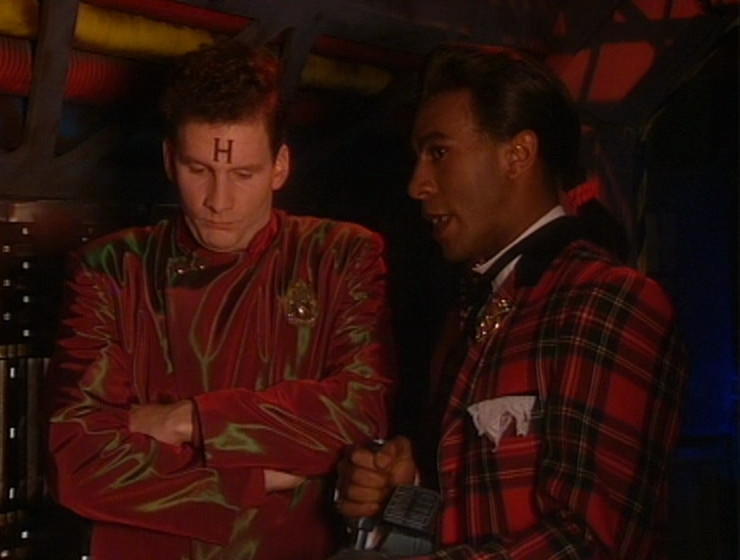

Which leads us into the finale of Series V, “Back to Reality” – one of the finest half hours of sitcom ever made. And if the show is going to do a meditation on the nature of reality and who our characters actually are… then Rimmer’s swimming certificates are the ideal bit of history to reference.
So when the crew stagger out of the Total Immersion Videogame they’ve been playing, and have a conversation with the friendly technician in the “real world”, we get the following:
ANDY: Which one was Rimmer?
RIMMER: Me.
ANDY: Ohhh, he’s amazing, in’t he?
RIMMER: You can say that again.
ANDY: How long did it take you to suss him out, then?
RIMMER: Oh, I had him sussed right from the beginning.
ANDY: Really? You found the Captain’s message right away?
RIMMER: What Captain’s message?
ANDY: The one that’s hidden in the microdot in the ‘i in Rimmer’s swimming certificate. Well, that’s the clue, isn’t it? Rimmer having a swimming certificate and not being able to swim.
KRYTEN: That’s a clue?
ANDY: It’s a blatant clue, isn’t it?
RIMMER: A blatant clue to what?
ANDY: A blatant clue to the truth behind Rimmer.
RIMMER: What truth?
ANDY: The truth to why he is such an insufferable prat!
RIMMER: That’s because of his parents, his upbringing, his background. The fact that he was never loved.
ANDY: No, no, no.
RIMMER: Yes, yes, yes.
ANDY: No, no, no.
RIMMER: Yes, yes, yes.
ANDY: …No!
Of course, all this turns out to be nonsense. The crew haven’t been playing a videogame at all, and all this turns out to be a hallucination. But the fact that the show zones in on the swimming certificate as being central to Rimmer’s character is telling. “Back to Reality” is playing with the show’s mythology, and the secret to Rimmer’s character really is in his swimming certificates… whatever level of reality we’re dealing with.1
With all this in mind, it’s worth pointing out that these verbal references are far from the only appearances of Rimmer’s beloved certificates. (Presumably some of the very few exams he’s ever passed, if not the only exams he’s ever passed.) Those certificates have already been part of the show well before the dialogue in “Me²”. If we go right back to the very first episode “The End”, there they are, next to Rimmer’s bunk:

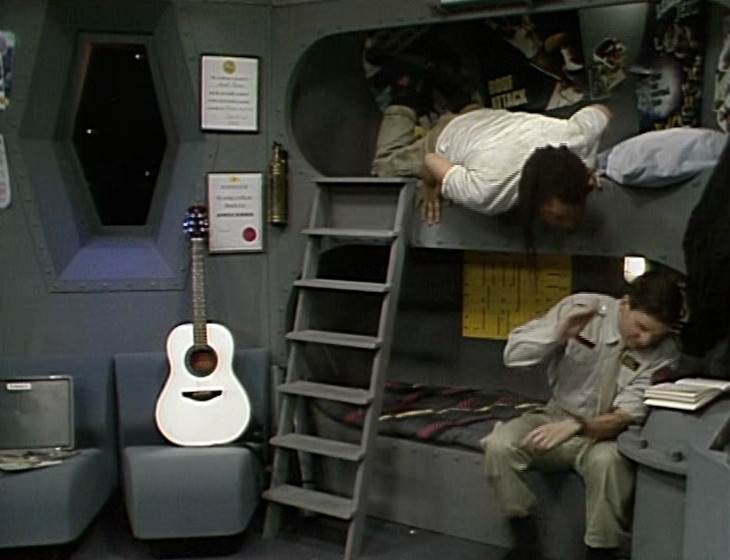
Even more hilariously, take a look at the Radio Times capsule for the very first broadcast of “The End”:
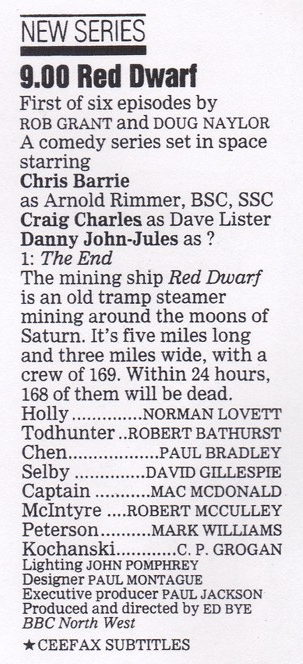
A joke, set up in the Radio Times and in the background of the show’s main set in the very first episode… but you have to wait five more weeks for it to pay off. Lovely.
* * *
Not that this was the first time Grant Naylor used this joke. Take a trip with me, five years before Red Dwarf made it to the screen.
Radio 2 sitcom Wally Who? (1982) is generally regarded as the runt of the litter in Grant Naylor’s radio comedy oeuvre. Radio 4 sketch show Son of Cliché (1983-4) gets the most praise, all of which is thoroughly deserved – and which itself has plenty of jokes and ideas which were reused in Red Dwarf. But their previous sketch show Cliché (1981) has many excellent moments too, as does nursing home sitcom Wrinkles (1980-1).
In comparison, it’s difficult to find anybody with a good word to say about Wally Who?, a show following the misadventures of a man who lives in a scrapyard, without the benefit of either time travel or Harry H. Corbett to liven things up. For a start, no matter what the show seems to be up to in any particular episode, it always ends up sounding like a rip-off of Hancock.2
But it still has some interesting moments, especially in the second episode broadcast, “The Whiz Kid”. Through the usual series of misadventures, Wally ends up posing as a merchant banker, complete with bemused assistant:
WALLY: What are those frames up there on the wall?
TIM: Oh, they’re just for certificates and qualifications – your degree, your FSA business diplomas, that sort of thing.
WALLY: Oh, I see – you just sort of stick them up there and show them off, do you?
TIM: Yes, I suppose so – sort of a…
WALLY: I’ll have to bring my lot in then! Now, I’ll tell you what’ll look good up there as a centrepiece – my bronze medallion life-saving certificate.3
TIM: That’s swimming is it, sir?
WALLY: Yes! And it’s not an easy one that, Tim: you have to swim two lengths in a pair of pyjamas.
That was broadcast on the 14th November 1982. Over five years before “The End”, and over nine years before “Back to Reality” made it to the screen.
It’s hardly unusual for jokes to be reused and repurposed in this manner. But I find this particular example fascinating. Because it’s not just a joke; it’s an idea which really did become an important part of Red Dwarf‘s mythology. Heard in embryonic, throwaway form, on a badly-regarded Radio 2 sitcom. Important ideas can spring from the most unlikely of places.
After all, Wally tells his friends at the end of the episode:
WALLY: And of course, it didn’t help the situation when the chairman walked in and caught me reading The Stock Market Made Simple: A Child’s Introduction…
Hmmm…
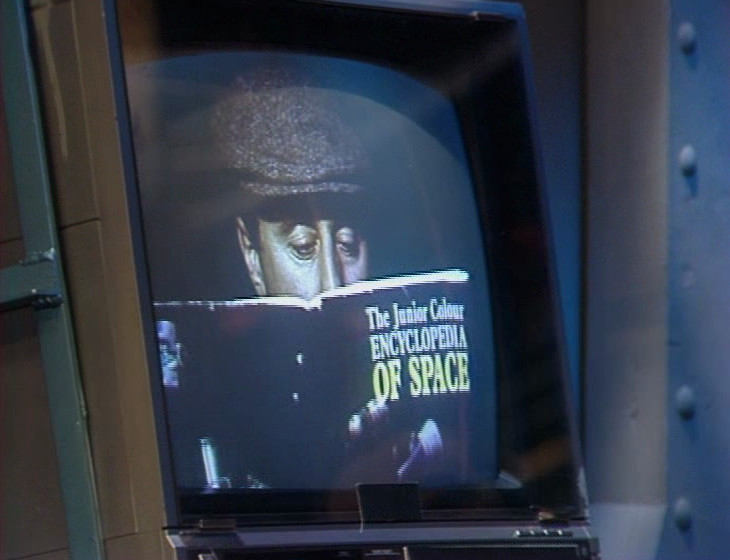
Oh Holly, you rascal.
With thanks to Tanya Jones, Darrell Maclaine-Jones, and Pete Martin.
Given that the point of the episode is the hallucination is based around each character’s own neuroses, we can only assume that Rimmer is subconsciously aware of this too. ↩
Rob Grant talks more about this issue on his website, along with some fascinating background detail on the series. ↩
Here’s something odd. Wally Who? specifically refers to the certificate as a “life-saving” award, while Red Dwarf doesn’t. At least, not in dialogue, and it’s difficult to see what is actually written on the certificates in the episodes themselves.
This is where fandom comes in ridiculously useful, as somebody actually owns the original certificate prop. And it’s clearly stated to be a life-saving award! A nice coincidence, or did an early draft of one of Dwarf‘s scripts specifically mention the life-saving aspect? ↩
